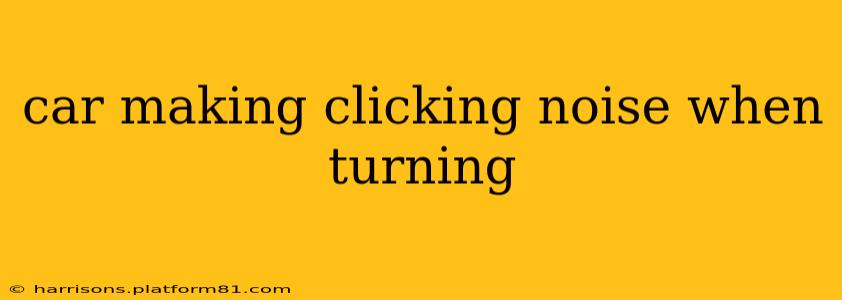A clicking noise when turning your car can be a worrying sound, indicating a potential problem that needs addressing. This isn't something to ignore, as a seemingly minor click could escalate into a more significant and costly repair. This comprehensive guide will delve into the common causes of clicking noises when turning, helping you diagnose the issue and understand potential solutions.
What Causes a Clicking Noise When Turning?
Several components in your car's steering and suspension systems could be the source of clicking sounds when turning. The precise cause often depends on the frequency, intensity, and location of the noise. Let's explore the most frequent culprits:
1. CV Joints (Constant Velocity Joints):
This is arguably the most common cause of clicking sounds while turning. CV joints transmit power from the transmission to the wheels, allowing for smooth articulation during turns. A worn or damaged CV joint will often produce a clicking sound, especially when turning at low speeds or making sharp turns. The click is usually more pronounced at full steering lock. Ignoring this issue can lead to complete CV joint failure, potentially causing a loss of control.
2. Worn Ball Joints:
Ball joints connect the control arms to the steering knuckles, enabling the wheels to move up and down and steer left and right. If a ball joint is worn or damaged, it can produce a clicking or popping noise, particularly when turning or going over bumps. This noise often gets worse as the car's suspension compresses. A faulty ball joint compromises your vehicle's handling and stability, posing a safety risk.
3. Tie Rod Ends:
Tie rod ends are part of the steering system, linking the steering rack to the wheels. Worn tie rod ends can create a clicking or knocking sound, especially when turning. Just like with ball joints, this compromises steering precision and control, potentially causing dangerous driving conditions.
4. Wheel Bearings:
Wheel bearings support the weight of the car and allow the wheels to rotate smoothly. Worn wheel bearings can produce a variety of noises, including clicking, grinding, or humming. While this can occur at any speed, it’s often more noticeable when turning, as the load on the bearings changes.
5. Steering Rack:
In some cases, a problem with the steering rack itself can cause clicking. This is less common than the issues mentioned above but could involve wear and tear on the rack's internal components.
How to Diagnose the Clicking Noise?
Pinpointing the exact source requires a careful inspection. While not a substitute for professional diagnosis, these steps can help narrow down the possibilities:
- Listen carefully: Note the frequency, intensity, and location of the clicking noise. Is it a constant click or intermittent? Does it change with the speed or sharpness of the turn?
- Inspect visually: Check for any obvious signs of damage or wear on the CV joints, ball joints, tie rod ends, and wheel bearings. Look for grease leaks or unusual movement.
- Test the steering: Turn the steering wheel slowly back and forth, noting when the click is most pronounced.
- Test at different speeds: Turn at different speeds to see if the noise changes in character or intensity.
What to Do if You Hear a Clicking Noise When Turning?
If you hear a clicking noise when turning, do not delay seeking professional help. Ignoring these issues can lead to more extensive damage and potentially dangerous driving conditions. A qualified mechanic can accurately diagnose the problem and recommend the appropriate repair. They will likely perform a thorough inspection of the steering and suspension systems, and perhaps a road test, to identify the source of the noise.
Frequently Asked Questions (FAQ)
How much does it cost to fix a clicking noise when turning?
The cost to repair a clicking noise when turning varies greatly depending on the cause and the severity of the damage. Replacing a CV joint can range from a few hundred to over a thousand dollars, while fixing a worn ball joint or tie rod end might be less expensive.
Can I drive with a clicking noise when turning?
While you might be able to drive with a clicking noise, it's strongly advised against it. Continuing to drive with a damaged component could cause further damage and compromise your safety.
How long can I drive with a clicking noise before it gets worse?
This depends entirely on the underlying cause. In some cases, the issue might gradually worsen over time, while in others, complete failure could occur suddenly. It's best to get it checked as soon as possible.
Is a clicking noise always serious?
While not always indicative of a catastrophic failure, a clicking noise when turning should always be investigated by a professional. It often indicates a wearing component that needs attention to maintain safety and vehicle integrity.
This information is intended for general guidance and should not replace professional advice from a qualified mechanic. Always have your vehicle inspected by a trusted professional if you are experiencing any unusual noises or issues. Regular maintenance and inspections are crucial for preventing potential problems and ensuring the safe operation of your car.
